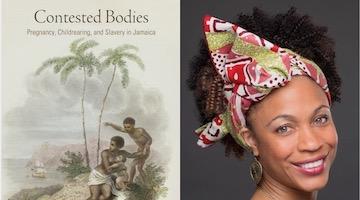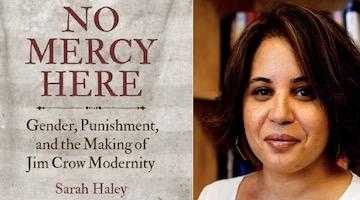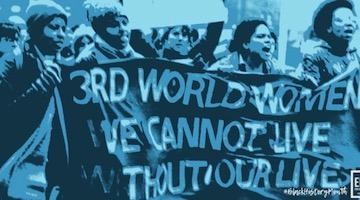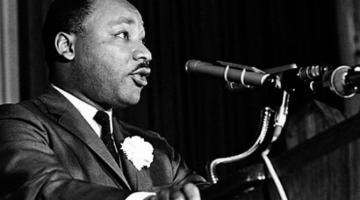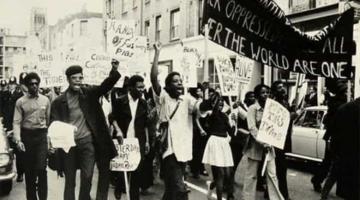In this series, we ask acclaimed authors to answer five questions about their book. This week’s featured author is Mali Collins. Collins is Assistant Professor of African American and African Diaspora Studies at American University. Her book is Scrap Theory: Reproductive Injustice in the Black Feminist Imagination.
Book description (from the publisher):
Reproductive justice debates have often focused on the right to not have children, but rarely do they address the right to remember children lost to violence. Turning her attention to visual and written works by Black women documenting mother–child separation, Mali D. Collins invites us to deploy a theory of “scraps” to understand the ways that the lives of Black mothers and children are documentations of centuries of racialized and gendered torment. Focusing on creative works from the late twentieth century through the present, including the writings of Toni Cade Bambara, M. NourbeSe Philip, and Edwidge Danticat; the critical activism of Erica Garner; and visual/material art by Samaria Rice and Elizabeth Catlett, Collins argues that Black women’s creative work should be recognized as memory work that plays a crucial role in the cultural processing of racial and maternal trauma. By centering creative scraps—interstitial, fragmentary, or discarded elements—of maternal dispossession, Scrap Theory brings together theories of archival injustice and reproductive injustice to illuminate how the archival erasure of Black motherhood is an urgent concern for the movement for reproductive justice.
Roberto Sirvent: How can your book help BAR readers understand the current political and social climate?
Mali Collins: As many readers already know, Black people have endured sexualized and racialized degradation long before the government started projecting and performing degradations on white women’s reproductive lives through legislative “wins” and “losses.” Now, in our current post-Dobbs America, reproductive rights are no longer ostensibly available for anyone and perhaps not for some time. As we see that rights have been both quietly and loudly stripped away to varying degrees in different parts of the country, Scrap Theory grounds BAR readers in re-locating Black mothers and their children as the bellwethers in our ongoing reproductive “battles” for the right to raise children safely into adulthood. By analyzing the ways in which Black mothers have fought to document these battles, BAR readers can also learn how state power demands the expansion of the category of reproductive violation, and by doing, the many ways that reproductive justice activism of Black mothers and children has also expanded to the realm of the right to preserve and remember the lives and deaths of our children.
What do you hope activists and community organizers will take away from reading your book?
I hope by distending the social, institutional, and experiential location of the “mother” to include mother land and mother tongue, we can see how the theft of language and land is also a reproductive injustice. This book is simply a complement to the resistance work that Black women and femmes have done for centuries: These people have worked to maintain the semblance of autonomy over their and others’ bodies as much as possible. I hope also that those who do not identify as activists and community organizers will find this book useful, as there always seems to be a “TM” that follows the term Black activists nowadays. (The category of activist is also disrupted in this book to include those who caretake.) This book is also for the girls and gays who like to problematize the category of memory, the non-binary folks who are considering what it means to be a parent, the trans-heroes uncles, aunties, and Zazas, the grad students who read their textbooks aloud to their kids at night so they don’t fall behind on their reading, those who remain “stateless” in the eyes of our authoritarian and white supremacist government, the student activists expelled from their universities for standing up for human rights, and the single parents who are working to give their children a better life while re-parenting themselves. What I hope folks will take away from this book is that by destabilizing the category of mother in our search to understand the whole breadth of reproduction we also must throw into question what and who is a “child.” By throwing these terms into crisis, we can then confront that we are all children living through the threat and completion of total dispossession, and that colonization is the determining factor of that dispossession. It is in this understanding that we can find comfort and care in each other to invent a balance for being Black and vulnerable to reproductive injury.
We know readers will learn a lot from your book, but what do you hope readers will un-learn? In other words, is there a particular ideology you’re hoping to dismantle?
I hope that readers unlearn reproductive justice as something that only pertains to white, upper-middle class able-bodied white women, archival documentation as something that is material rather than imagined, and art as fiction or merely representational.
Reproductive justice as a white woman’s concept and movement has long been disrupted in many texts as well as through the lives of many day-to-day lives of black women and femmes, and this book joins this tradition by simply offering a framework from which they can be learned. Scrap Theory then pivots to ask to what extent reproductive justice rights are violated on the register of memory and specifically the memory of those who are murdered, killed, or violated at the hands of the state. By using the creative works of Black mothers to attest to these violations, readers will unlearn creative work as a mirror to the horrors of living through Black mother-child separation but rather the novel, installation, or the poem as the documentation of those injuries. This book at the very least invites some disorganization around these terms and for readers to sit with that disorganization while learning about some wonderful Black women culture workers.
Which intellectuals and/or intellectual movements most inspire your work?
I begin this book with an anecdote about Tamir Rice and his life inspires my work. The mothers who are in jail right now at this very moment are living the world in praxis as they live in/with parent-child dispossession and the effects of it also. As this book takes up the cultural works of Black women to tell the stories of black mother-child dispossession in collaboration with traditional historical evidence such as slave ledgers, bills of sale, and personal journals, I am also very much inspired by Black mother artists such as Caroline Kent, Margaret Walker, Elizabeth Catlett, Darlene Taylor, writers like Ashia Bomani Ojore and Jesmyn Ward. I also think that it is important to note to writers and culture workers out there that the impetus for this book started as a love letter to my first child and a suture to the pain I felt raising a Black child in a world that did not support his life. The realm of “made up” inspired me to understand that the marginalia of everyday life is what makes up the day-to-day of living in reproductive injustice.
Which two books published in the last five years would you recommend to BAR readers? How do you envision engaging these titles in your future work?
Denise Ferreira da Silva’s Unpayable Debt is currently informing my current work. This book investigates the possibilities of abolishing the hospital in its current for-profit, over-policed, and exploitative form. It is especially influencing my chapters on the medical experimentation done on black men in prisons that occurred during the 20th century and contributed to major advances in the invention of RhoGam to all but solve the 15% infant death crisis in the early 20th century, and to attend to the contemporary crises of hospital debt prisons that incarcerate mothers and children due to unpaid birth bills.
Although it is not a book, a bonus suggestion to all who are reading would also be Mahmoud Khalil’s letter from jail and his letter to his newborn son, Deen. It is a gut-wrenching reminder that the state is invested in the separation of children and parents during parturiency. I am also struck by the connections between the dispossession of reproductive rights of Palestinians (both in Palestine and in the US), but especially in the targeting of children. The West’s project to hurt a group of people by cutting off the creators of that peoples’ future—children—is unforgiveable. Reading his first letters’ final words of, “Knowing fully that this moment transcends my individual circumstances, I hope nonetheless to be free to witness the birth of my first-born child,” and now knowing that he did not witness that birth, has haunted me ever since my original reading. We should all remember that the political moment in which we lives transcends all our individual circumstances, not just for the children that exist now, but the ones who will be born in the future.
Roberto Sirvent is the editor of the Black Agenda Report Book Forum.



